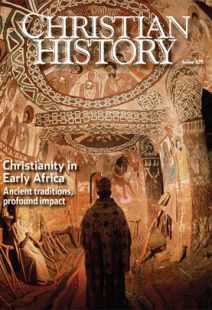Early African Christianity: Did You Know?
Born in water, carried by prayer
Africa is the home of many Christian “firsts.” To Tertullian of Carthage we owe the earliest Christian treatise about the sacraments, On Baptism: “But we, little fishes, after the example of our ΙΧΘΥΣ Jesus Christ, are born in water, nor have we safety in any other way than by permanently abiding in water.”
Tertullian also wrote a famous treatise on the Lord’s Prayer, reminding us that “Even the Lord Himself prayed; to whom be honor and virtue unto the ages of the ages!” (For more on Tertullian, see “See how these Christians love one another,” pp. 29–33. Bold-face names and places will be found on the map, pp. 22–23.)
Money and music
Then there is Clement of Alexandria. The first Christian treatment of economics is his “Who Is the Rich Man that Shall Be Saved?” He also wrote the oldest Christian hymn whose authorship is known, in about AD 200. Usually translated “Shepherd of Tender Youth,” it reads in part,
Thou art our holy Lord,
The all-subduing Word,
Healer of strife:
Thou didst Thyself abase,
That from sin’s deep disgrace
Thy mightest save our race,
And give us life.
Serpent repellent?
Finally, we owe many “famous firsts” to Augustine. His Confessions represent an early example of how to give testimony to encourage other believers.
He also was essentially the first to define original sin as the guilt that we inherited from Adam and Eve and to argue that baptism is needed to wash it away, no matter the age of the recipient. He wrote in On Merit and the Forgiveness of Sins, and the Baptism of Infants: “As infants are by the sacrament of baptism conformed to the death of Christ, it must be admitted that they are also freed from the serpent’s poisonous bite.”
This also led Augustine to articulate a view of predestination that would dominate later Western Christianity, in which God graciously chooses to save some of the mass of human beings guilty of original sin.
Need a scorecard?
Making your way around early African Christianity means learning about Christian groups new to many Westerners. Early Africa included both Latin-speaking (Western) and Greek-speaking (Eastern) Christians. The Eastern or “Byzantine” half of the Roman Empire, headquartered at Constantinople in Asia Minor, spoke Greek. Eventually, its churches and the churches headquartered at Rome divided.
But long before that, early Christians were debating issues regarding the divinity of Christ and the relationship between his human and divine natures in ecumenical councils where church leaders came together. One, at Chalcedon in 451, wrestled with how Christ’s human and divine natures related. It declared that although Christ was one person he had two distinct natures.
Some Christian traditions, whose stories we tell in this issue, rejected Chalcedon, declaring that Christ had a single nature which was both human and divine. Today, you will sometimes hear these churches called “Oriental Orthodox.” They are separate from the Eastern Orthodox Church (which accepts Chalcedon) and include churches in both Egypt and Ethiopia (see “From Abba Salama to King Lalibela” pp. 18–21, and “Some others you should know,” pp. 36–37).
Hard to get to
Monks at Debre Damo have a long climb. This Ethiopian monastery, in continuous use since the sixth century, contains many priceless artifacts. It can only be reached by rope. Male visitors tie a rope around their waist and are pulled up the cliff by a monk at the top. Women are permitted to pray only at the bottom. Female animals are also forbidden on the grounds. CH
By the Editors
[Christian History originally published this article in Christian History Issue #105 in 2013]
Next articles
Editor's note: Early African church
In this issue we walk through everything from ancient archaeological ruins to modern-day worshiping communities
Jennifer Woodruff TaitListening to the African witness
Two modern scholars reflect on Christianity in Africa, then and now
Jacquelyn Winston, Lamin Samneh, and the EditorsThe hunger games and the love feast
Perpetua’s martyrdom account gives us a window into North African spirituality
Edwin Woodruff TaitSupport us
Christian History Institute (CHI) is a non-profit Pennsylvania corporation founded in 1982. Your donations support the continuation of this ministry
Donate



